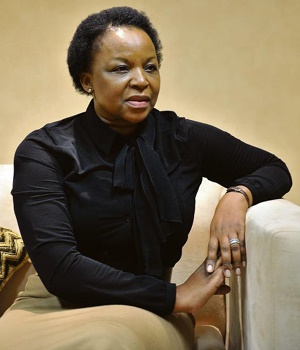
Johannesburg - We’re met by uber friendly guards at the gates of the Sandton head office of the Industrial Development Corporation (IDC), ushered through tight security and into a waiting room where, to our astonishment, the institution’s chairperson, the friendly and unassuming Busisiwe Mabuza, is waiting for us.
She offers us cappuccinos and chuckles when I speak of her low media profile.
At the end of our interview, it’s clear that this firm, elegant and worldly woman is eminently suited to her role.
Mabuza has worked in risk and asset management both here and in New York.
A few years ago, she ran her own business in Johannesburg and, metaphorically, trudged the streets to find funding to help women establish their own companies.
“There are some fantastic female entrepreneurs in South Africa, but we need many more across all race groups. We comprise more than half the population, and our female characteristics of inclusivity and sharing need to be accessed more widely to grow our economy.”
Mabuza is frank about being depressed at the state of the latter. She recalls the days when South Africa was “firing on all cylinders” and wants to see the country regain that positive energy.
She believes that we started our “downward slide into the doldrums, possibly because we were too relaxed about being shielded from the 2008 global meltdown”.
The IDC, established in 1940 to promote economic growth and industrial development, is involved in projects ranging from boosting future scientists in disadvantaged schools to the KaXu Solar One energy plant near Pofadder in the Northern Cape.
It is the first solar thermal electricity plant in the country and the biggest of its kind on the continent – and the southern hemisphere.
Mabuza believes the IDC as a development finance institution “should be more accessible to people who want to develop a business”.
“At the moment, people find it difficult to access our services and I’d like that to change in order for us to have the impact we need both here and throughout the rest of Africa.”
That is the challenge she has set herself.
Mabuza talks about South Africa being “two worlds in one”.
“Economic opportunities now in the hands of a few people need to be spread among many more so we can generate millions of jobs and businesses.”
She’s fully aware that this cannot be achieved overnight and that the IDC “cannot be everything to everyone”.
“But we need to channel our services better.”
Mabuza’s goal while still at school in Pietermaritzburg was to study chemical engineering. But she couldn’t master the drawing skills required and decided to study mathematics.
The 1986 state of emergency put paid to her hopes of graduating in South Africa and she moved to the US, where she obtained a BA in mathematics and computer science in 1991 from City University of New York.
Mabuza joined a risk management company in New York as a systems analyst while studying for an MBA in finance and information systems.
“For the first time, I saw smartly dressed black people in positions of power and everything suddenly seemed possible. New York opened my eyes. I realised how we are all interconnected on our planet.”
With the advent of democracy in 1994, Mabuza returned home and decided to work in financial services. Within 18 months of joining Investec’s asset management team, “back then there were only 20 of us young and bright people”, she had become a junior analyst.
She left Investec at the height of the dotcom boom in 2000, “when all valuations were going through the roof and analysts could get top-paying jobs” to work as a special adviser to the minister of minerals and energy.
Since then Mabuza has worked at a number of companies, including Ethos Private Equity, where she was a director. She has been a nonexecutive director at more companies than we’ve had cocktails and was one at the IDC when she was appointed chairperson in March this year.
Mabuza’s humble beginnings, the child of two teachers in the Barberton township of Emjindini, have provided her with the insight and sensitivity that has helped her to see the tremendous untapped potential of millions of her fellow citizens who, she believes, can create their own business lives.
Little black book
Business tip: Keep abreast of world trends so you know what will work for your business in South Africa.
Mentor: My geography teacher, Nontsikelelo Qwelane, who is still working at the age of 95. She was deservedly awarded the Order of the Baobab last year for her outstanding contribution to education in South Africa, and for being an inspiration and role model to both young and old.
Books: Half of a Yellow Sun by Chimamanda Adichie. It’s so powerfully and beautifully written that I can really identify with its young heroine.
Inspiration: My eccentric science teacher at Epworth High School, who brought the subject alive for me.
Wow! moment: Well, it goes on and on as I encounter the resilience and strength of women in their daily lives.
Life lesson: Relating to and valuing people from all walks of life. In this way, I have learnt from both good and bad relationships




 Publications
Publications
 Partners
Partners








